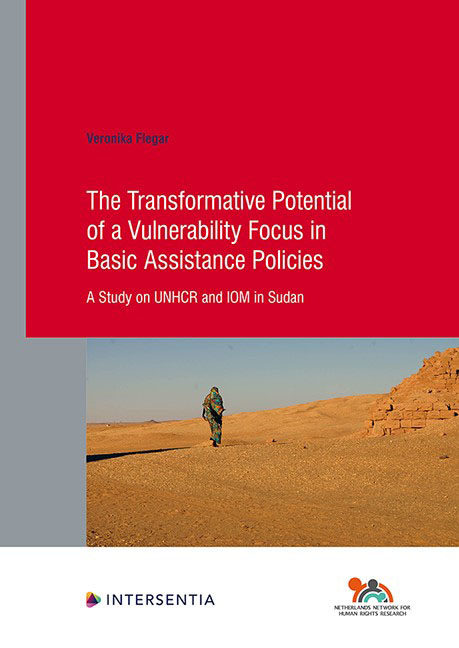 The Transformative Potential of a Vulnerability Focus in Basic Assistance Policies
The Transformative Potential of a Vulnerability Focus in Basic Assistance Policies Book contents
- Frontmatter
- Dedication
- Preface and Acknowledgements
- Contents
- List of Abbreviations
- List of Tables
- List of Figures
- Chapter 1 Introduction
- PART I NORMATIVE AND EMPIRICAL THEORY
- PART II BACKGROUND TO THE CASE STUDIES
- PART III CASE 1: ASSESSING AND ADDRESSING VULNERABILITY AT UNHCR KHARTOUM
- PART IV CASE 2: ASSESSING AND ADDRESSING VULNERABILITY AT IOM KHARTOUM
- PART V
- Bibliography
- Samenvatting
- Summary
- About the Author
- Human Rights Research Series
- Frontmatter
- Dedication
- Preface and Acknowledgements
- Contents
- List of Abbreviations
- List of Tables
- List of Figures
- Chapter 1 Introduction
- PART I NORMATIVE AND EMPIRICAL THEORY
- PART II BACKGROUND TO THE CASE STUDIES
- PART III CASE 1: ASSESSING AND ADDRESSING VULNERABILITY AT UNHCR KHARTOUM
- PART IV CASE 2: ASSESSING AND ADDRESSING VULNERABILITY AT IOM KHARTOUM
- PART V
- Bibliography
- Samenvatting
- Summary
- About the Author
- Human Rights Research Series
Summary
The term ‘vulnerability’ is often used in law and policy to refer to disadvantaged, marginalised or excluded human beings. Being ‘in a vulnerable situation’, belonging to ‘a vulnerable group’ or simply ‘being vulnerable’ are labels that policy makers, human rights advocates and others frequently use when seeking to address precariousness, deprivation, suffering and injustice. Why do we seem so fascinated by this term and its implications? What purpose and effect does the explicit pinpointing of vulnerability have? Does a focus on vulnerability actually help to improve the situation of the most disadvantaged and excluded? If so, how and under what circumstances?
These were only some of the questions that sparked my interest in vulnerability and led me to conduct this research. Scholars in the fields of human rights and social policy tend to disagree on the added value of the vulnerability notion. Some argue that a vulnerability focus can have a ‘transformative potential’ because it ensures that policies are “responsive to those who are disadvantaged, demeaned, excluded, or ignored” and therefore contribute to substantive equality. Others, however, suggest that a vulnerability focus can also have paternalising and controlling effects that might actually be counterproductive to substantive equality. This raises the question whether, and to what extent, the notion of vulnerability in normative theory and a practical, policy-based focus on vulnerability might complement or contradict each other.
To shed some light on this issue, the present study concentrates on the vulnerability focus in the basic assistance policies for non-citizens by the United Nations High Commissioner for Refugees (UNHCR) and the International Organisation for Migration (IOM) in Khartoum, Sudan in 2017 – 2018.
Why focus on non-citizens? Non-citizens are usually labelled on the basis of categories such as refugees, migrant workers, asylum-seekers or undocumented migrants. In public discourse, some of these categories (e.g. refugees) tend to imply more vulnerability than other categories (e.g. migrant workers). Yet, in being non citizens, all of these persons lack some degree of the protection that is usually awarded to citizens. This can increase their vulnerability to a large variety of risks such as poverty, exploitation or violence.
Exactly because non-citizens do not have the citizenship of their country of residence, this vulnerability often remains unrecognized and assistance is only provided reluctantly.
Information
- Type
- Chapter
- Information
- The Transformative Potential of a Vulnerability Focus in Basic Assistance PoliciesA Study on UNHCR and IOM in Sudan, pp. 449 - 460Publisher: IntersentiaPrint publication year: 2020